This is a history of an individual and the short-lived organization she created. It’s a story about the power, purpose and potential of young people in North Omaha, and the constant struggle between the City of Omaha and the Black community. This is a history of Beverly Blackburn (1937-1973) and the JFK Rec Center.
Meet the JFK Rec Center

The John F. Kennedy Recreation Center was located at 4514 North 24th Street between 1965 and 1970. It was also called the Blackburn Recreation Center after its founding owner Beverly Wead Blackburn Jones.
Mrs. Jones began her work with youth when she was 17 years old. Starting as a youth worker at the Kellom Community Center, in 1957 she became the director when she was just 20 years old. In 1964, Mrs. Jones became director of the North Side YWCA, and in 1965 she opened her own youth center to meet the needs of the community she lived in and loved.
The JFK Rec Center was located in a two-story building just north the intersection of 24th and Ames. Once a vibrant convergence of streetcars and traffic, it was filled with workers, shoppers, kids and other people shuffling to and from the suburban bliss that was once Saratoga. However, during the 1960s it emptied out, and by the time Mrs. Jones opened her community center most of the businesses and many of the residents had fled. This white flight was a phenomenon that started in 1919 in the Near North Side, and took 40 years to catch up to Saratoga. However, when it hit, the racism obliterated the infrastructure of the neighborhood badly.
Filled with activity spaces, a pool table and other activities, there were regular after school and summer programs for children and youth. There were recreational and educational, as well as dances and social activities. Mrs. Jones took young people on field trips throughout the city and beyond, including annual trips to the amusement parks in Kansas City.
Relieving Pressure
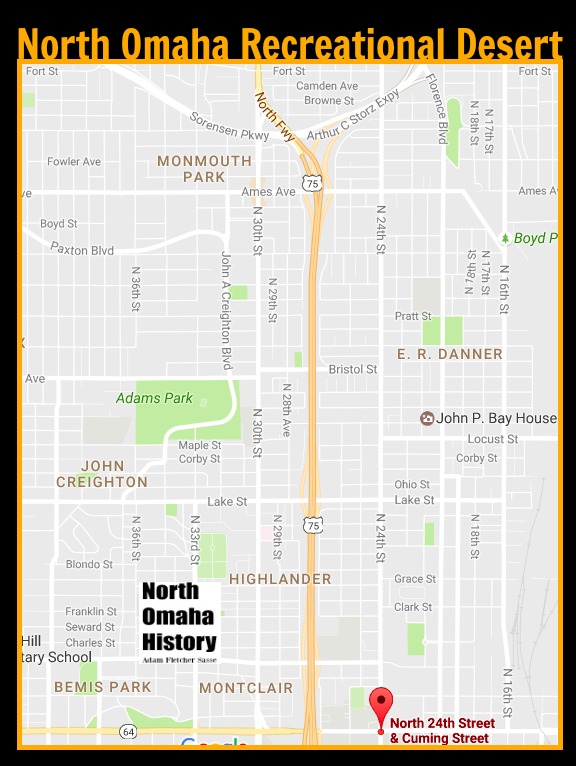
Between 1966 and 1969, there were at least four separate large scale riots in North Omaha. Tension throughout the community was high, and as west Omaha continued its endless expansion beyond old Omaha the city’s leaders increasingly ignored North Omaha. Residents took it upon themselves to do something for the community.
Founded in an old house by Mrs. Jones, the John F. Kennedy Recreation Center was intended to provide arts, culture and other programming for children and youth in the Saratoga neighborhood, which surrounds North 24th and Ames Avenue. Privately owned by Mrs. Jones for the first year of its operations, she acted as the center director, scheduling the classes, programs and other activities throughout evenings, weekends and the entire day during summertimes.
In 1966, the City of Omaha bought the building from Mrs. Jones and kept it operating. They provided movies for youth to watch, and ran late night dances too. Some of the programs they offered included classes for tap and ballet, baton, guitar, drama, and acrobatics, as well as charm and modeling classes.
Mrs. Jones also organized cultural enrichment trips for youth throughout the center’s existence. Over the years she arranged multi-day trips to St. Louis, Des Moines, Kansas City and other regional hubs around Omaha.
Tension Didn’t Stop

Throughout the summer of 1970, there were repeated disturbances at the Kennedy Rec Center. Apparently, youth would leave during and after the late night dances there and pile out into the intersection at North 24th and Ames Avenue. More than once, they apparently broken bottles, smashed windows and attacked the Omaha Police Department patrol cars that came to disperse the crowds. Throughout the summer, there were repeated reports of officers getting wounded, too. According to the Omaha World-Herald, there were more than 200 youth at some of these events, although interestingly enough these weren’t called “riots.” Instead, the paper used euphemisms like “disturbance” and “unruly gathering” to mask the events.
During these months, the police captain for the precinct repeatedly threatened to close the center because of these occurrences.
Closing the JFK Rec Center
On October 7, 1970, the Omaha World-Herald ran a story in which Mrs. Jones accused Mayor Eugene Leahy and the Omaha Police Department of harassing her.
That article reported that Mrs. Jones’ distinct orange Volkswagen bug was a regular target for Omaha Police Department officers. Her accusations were that white officers in the department had been pulling her over for trumped up infractions about once a week after January 1970. That’s when a group of youth chaperoned by Mrs. Jones were involved in a disturbance at the Roller Bowl at South 37th and Leavenworth Streets. According to the paper, “She said officers told her they were ‘get her’ for complaining about what she called ‘police brutality’ during the incident.”
Four days later, on October 11, 1970 the City of Omaha posted notice that they were closing the center due to the deteriorated condition of the building. Community advocates in North Omaha were highly critical of the City of Omaha for closing the center. William Dodd, a leader in North Omaha said,
“The city took it over, had some problems and rather than face the problems, they decided to close it down.”
-William Dodd, 1971
In February 1971, Mrs. Blackburn earned another article in the newspaper because of her charges against Omaha Police Department officers. She brought the department to court after she alleged three officers harassed her and verbally abused her during a traffic stop. The judge in the initial trial found her guilty of the traffic violation; I haven’t found the outcome of her case against the officers.
In June 1971, a City of Omaha staff member repeated the City’s position: “Recreation centers are fine and have their place but we’ve got to realize recreation is only supplemental. What these kids need is jobs… It’s more of a problem this year than ever. Unemployment is up and you’ve got the dope situation.”
Two years after the closure of the John F. Kennedy Recreation Center, the City of Omaha opened the Adams Park pool and community recreation center. They claimed that this facility, more than a mile away from the Kennedy Rec Center, was a replacement and should suffice.
Remembering Beverly Wead Blackburn Jones

Mrs. Jones continued her advocacy for youth. In 1971, she took a position with Omaha Public Schools at Horace Mann Junior High School on Florence Boulevard. There, she was a counselor, an administrative intern and an assistant principal. In 1971, she shared her analysis with the City of Omaha that there were no bowling alleys, roller rinks, movie theaters or indoor swimming pools in North Omaha between Cuming and Fort Streets, from 16th to 42nd Streets. She was genuinely concerned for the health and well-being of youth throughout the community, made her voice heard, and took action to improve the lives of others.
In 1972, Mrs. Jones became the individualized study center coordinator for the district, and in 1973 she was the project director with the Vocational Skills Center. She also owned a beauty shop at North 40th and Ames Avenue, owned her own club, and hosted an annual beauty pageant for young women in North Omaha.
Beverly Wead Blackburn Jones was 36 years old when she died suddenly from asthma in June 1973.
There were several events held in memory of Mrs. Jones after she passed away. They included a variety show by the Afro Academy for Dramatic Arts in 1973. In 1978, a jazz drummer named Roberto Shepherd held a concert in memory of Jones.
Perhaps the most fitting tribute to her, though, was the renaming of Omaha Public Schools’ alternative school after her. Located at North 26th and Hamilton Streets, today Blackburn Alternative Program serves hundreds of students annually. There are challenges at the school, but also, many success stories. This school routinely graduates students who have been given up on by others – just like Mrs. Jones did.
You Might Like…
MY ARTICLES ABOUT THE HISTORY OF SARATOGA
General: Timeline | Saratoga Belt Line Historic District | Tour of Saratoga Historic Sites
Homes: Stroud Mansion | Gruenig Mansion | Rome Miller Mansion
Businesses: J. F. Bloom and Company | Omaha Motor Car Company | Stroud Company | 4225 Florence Blvd | 4426 Florence Blvd | Saratoga Springs Hotel | Max I. Walker Cleaners | Imperial Sash and Window Factory | Metropolitan Building and Loan | J. F. Bloom and Company | Omaha Motor Car Company | Stroud Company | North Star Theater aka the Ames Theatre | Suburban Theater | LaRue’s | 4515 North 24th Street | Borden’s Ice Cream
Events: Trans-Mississippi and International Exposition | Greater America Exposition
Transportation: Belt Line Railway | North 16th Street | North 24th Street | North Freeway | Streetcars | Railroads | 24th and Ames Intersection
Other: Saratoga School | Saratoga Fire Station | Sulphur Springs | Druid Hall | John F. Kennedy Recreation Center | Omaha Driving Park | Prairie Park Club | YMCA Athletic Park
Surrounding Neighborhoods: Miller Park | 30th and Ames | Sherman | Kountze Place | Bedford Place | Monmouth Park | Collier Place


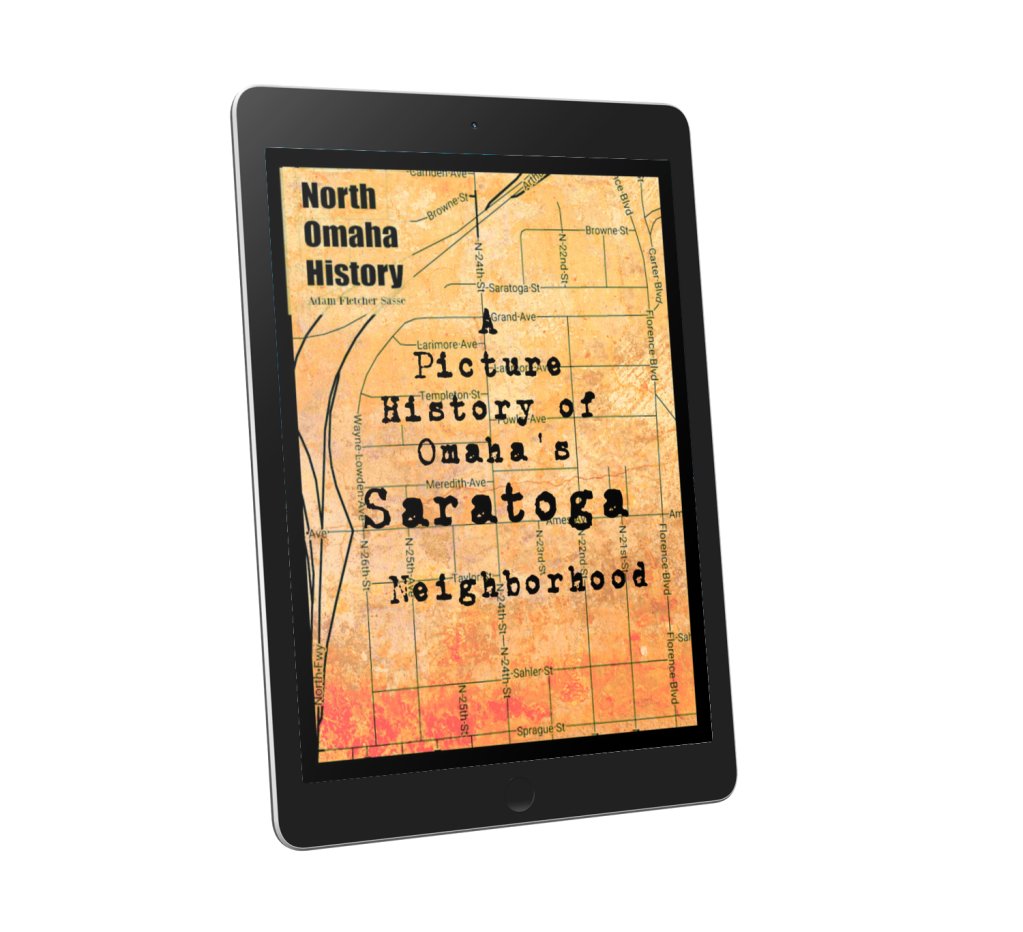
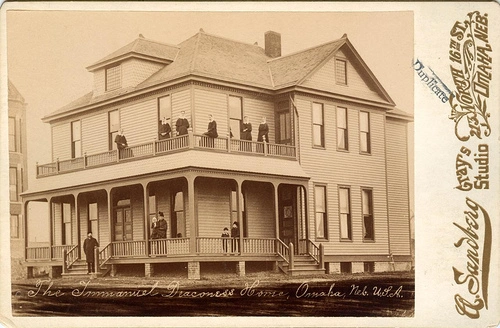

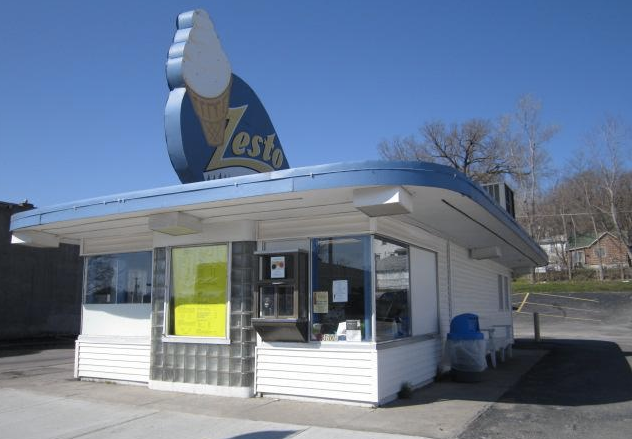
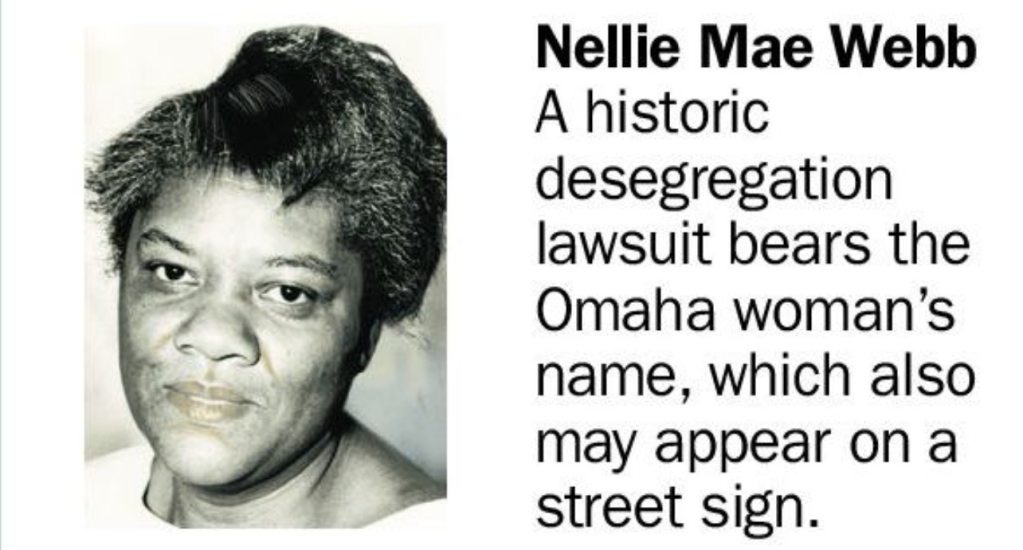
Leave a comment